Over 200 organisations (including us!) seeking to “expand consciousness and effect systemic change” are gathered in the Murmuration Project
We were intrigued to be included (see graphic above) in a report from the Murmuration Project (download PDF here). Their aim, expressed on the website, is as follows:
There are many organisations and networks in the UK who are helping people to expand awareness for what it means to be human. However, the individual and collective potential of these organisations and networks is limited as they are often are working in isolation and don’t have effective strategies for enabling systemic change.
The Murmuration Project is a research initiative that is helping organisations and networks understand how they can develop more effective leadership skills and strategies and work collaboratively to inspire and influence greater change.
The project is mapping the field through a creative inquiry with hundreds of leaders of organisations and networks expanding human consciousness. The intelligence revealed from this inquiry will aim to identify the most important challenges and opportunities and will be shared to help inspire individual and collective action.
It’s quite a field. The final pages of the report (p. 115 onwards) alphabetically lists 200 participating organisations “helping to expand human consciousness” - marked by these categories:
Spiritual
Nature/environment
Social systems/political/economic
Psychological/mind-body/wellbeing
Consciousness
There is also a section (p. 58) which, very unusually, shows datamaps of the size and nature of these organisations - a sectoral analysis, as it were. They’re gathered together in the slide show below:
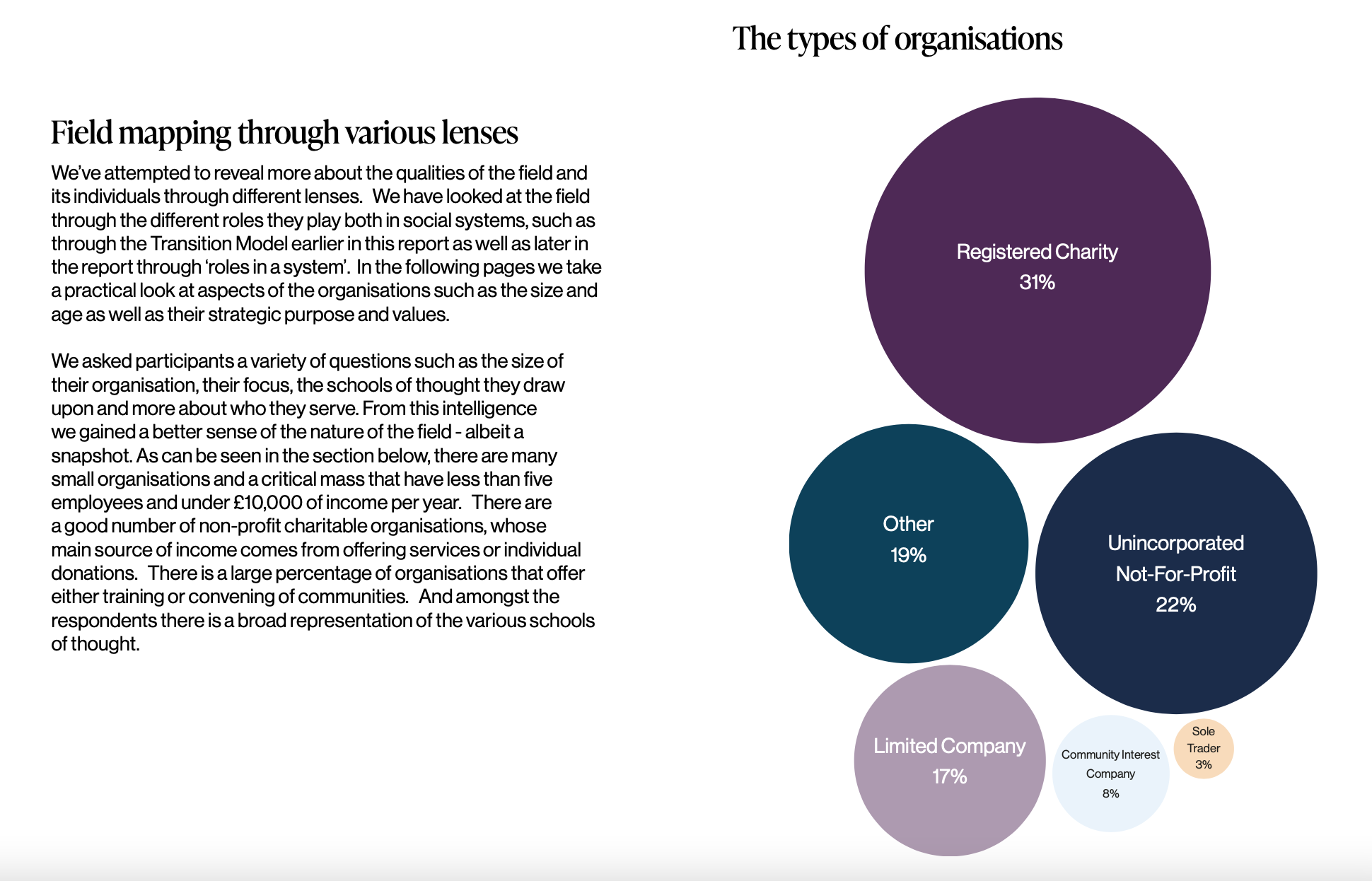
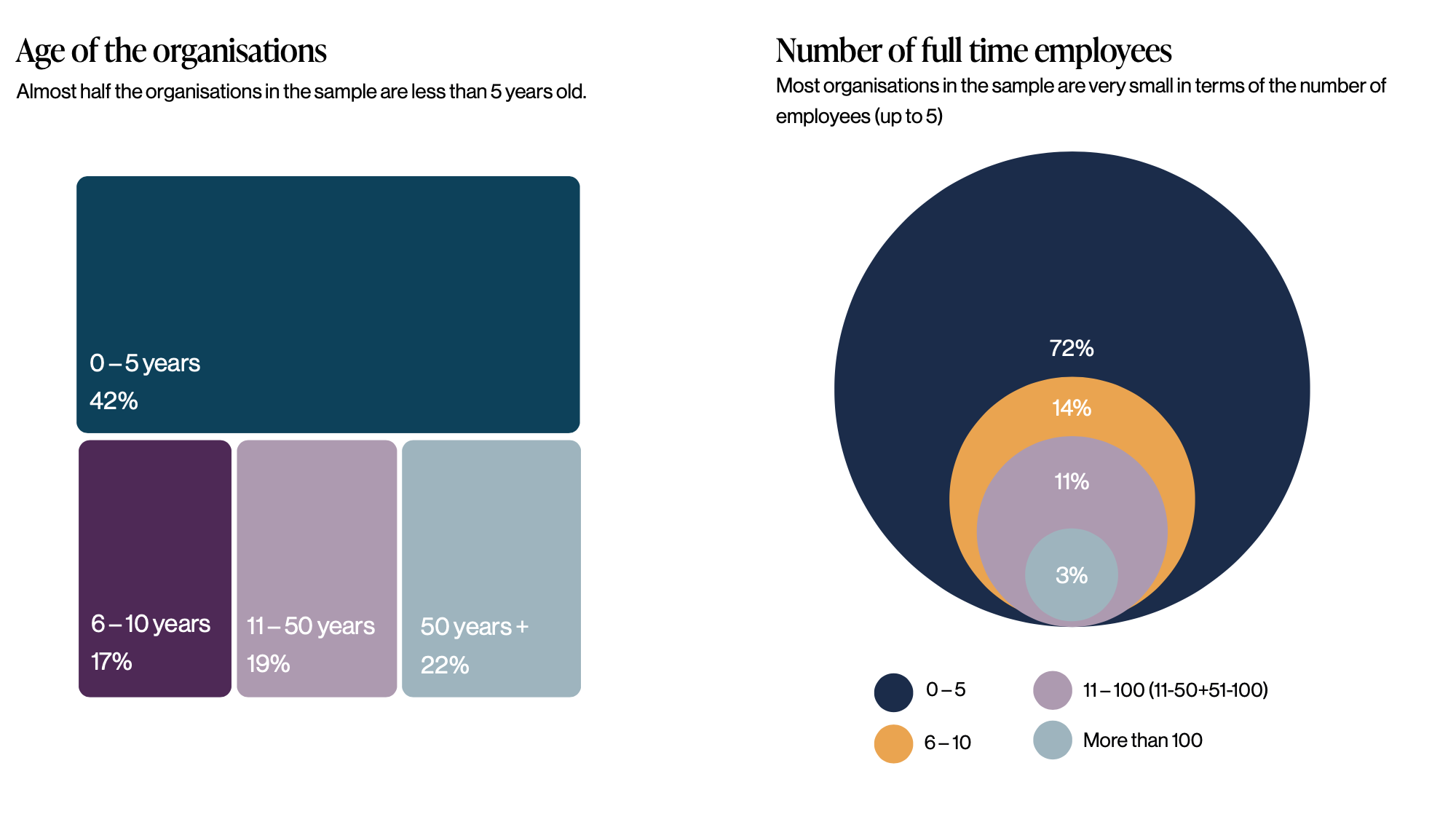
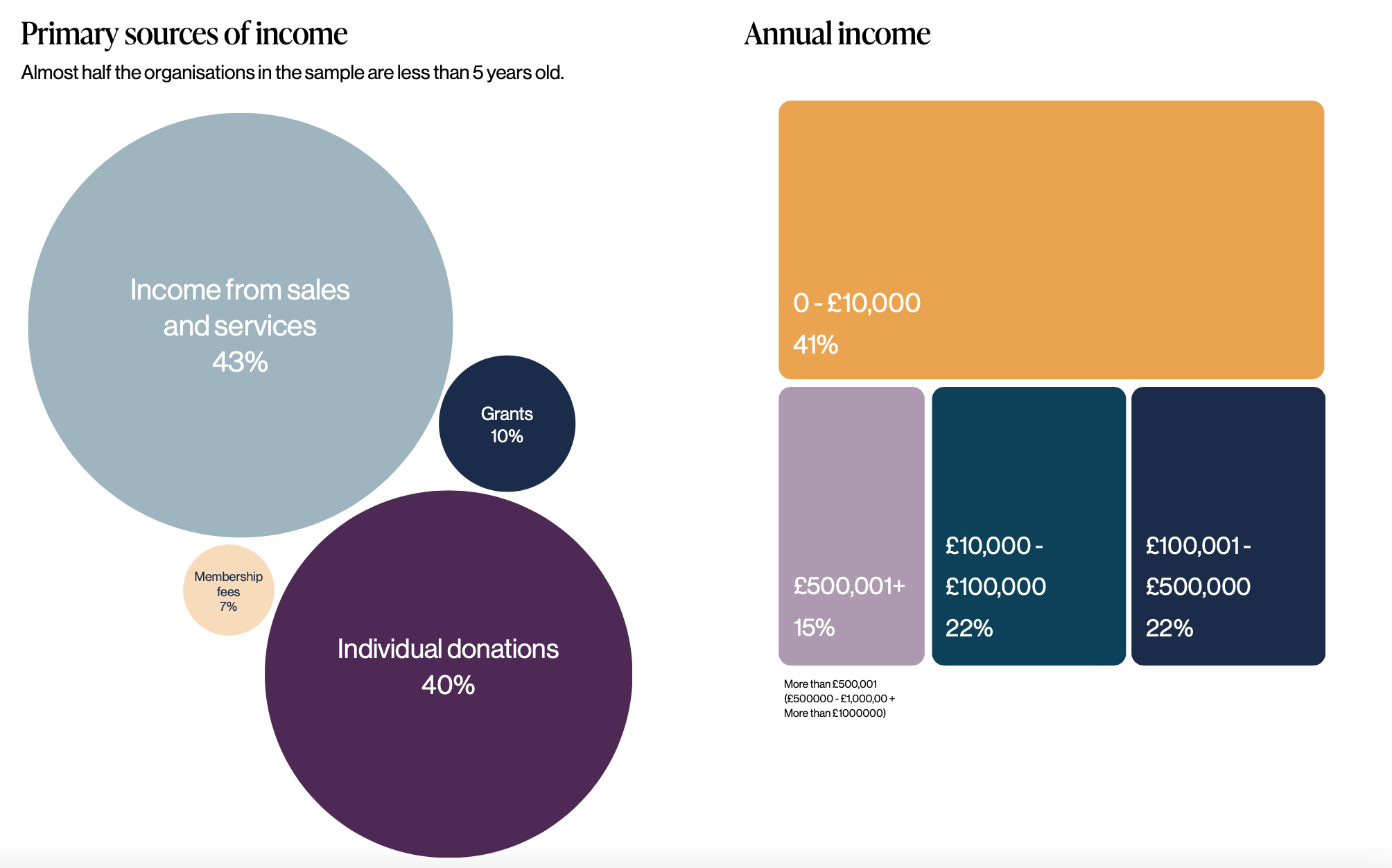
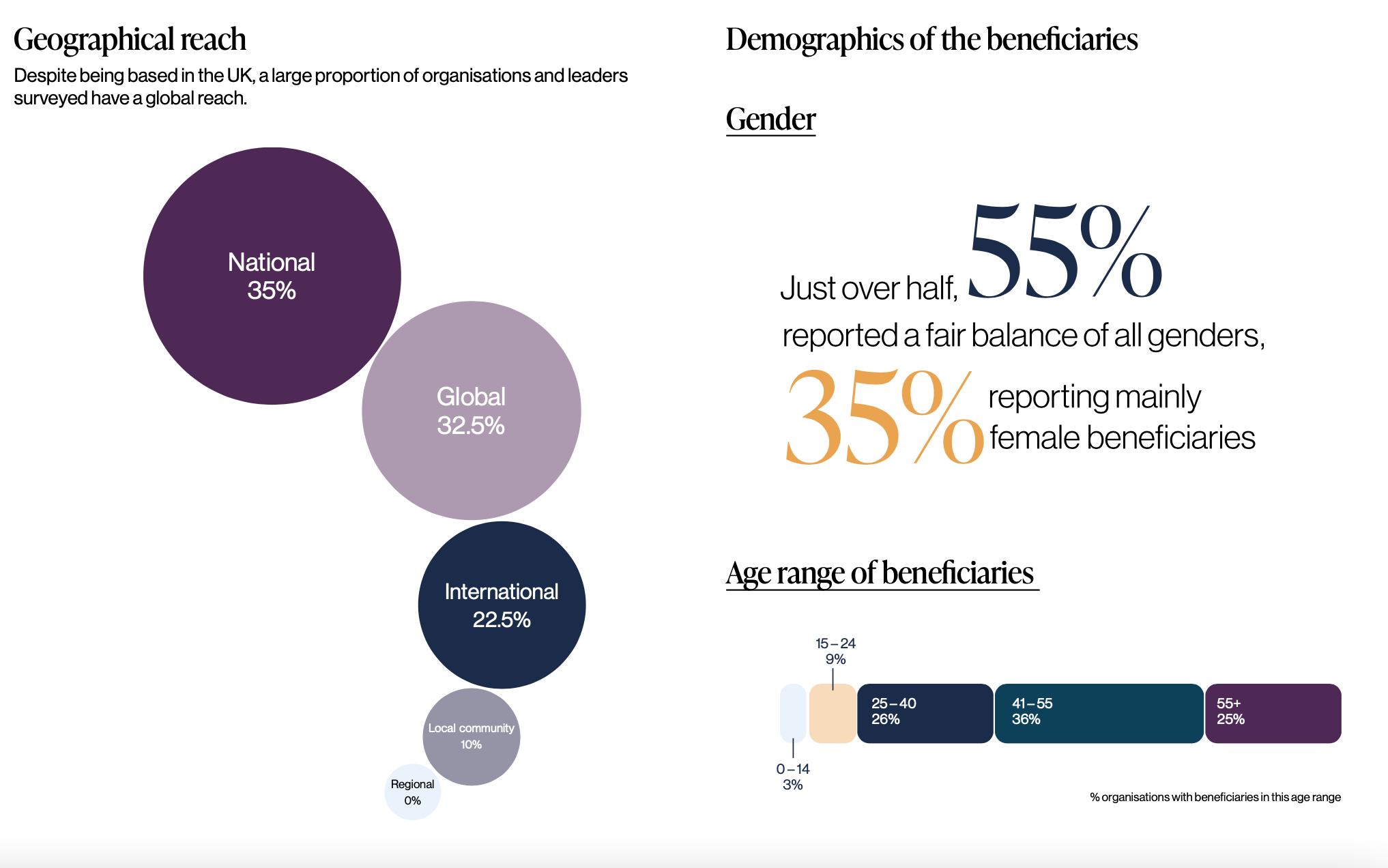
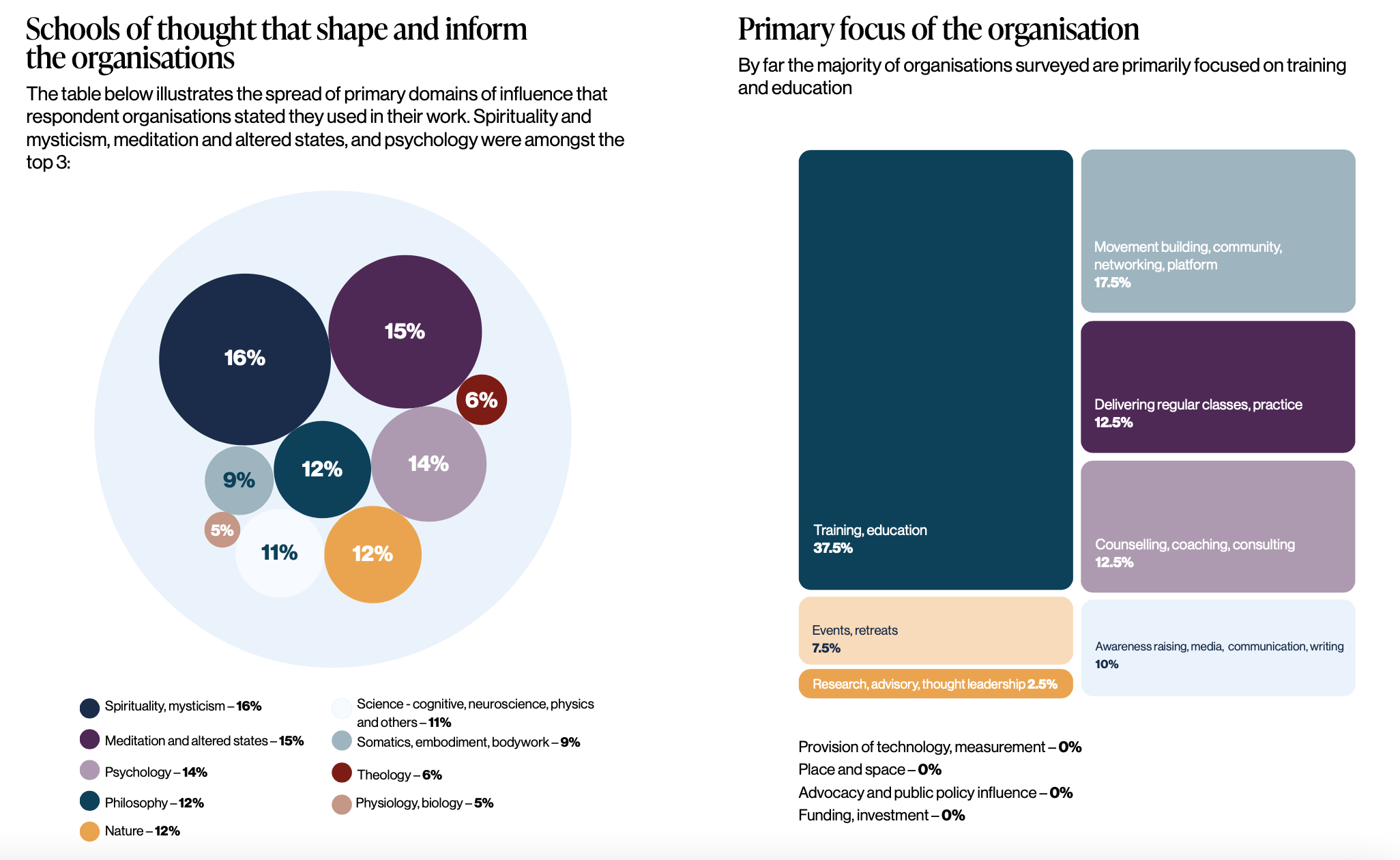
Building on this, the report asked participations about areas going well, not working so well, and needing strengthening:
Going Well
Engaged communities: Many respondents seemed to be seeing the fruits of their labour in commenting that their offer is landing well, and that their communities are connected, supportive
and vibrant.
Ability to adapt: There were also strong themes in celebrating the success of being able to adapt and respond to challenges including that of COVID 19. This included embracing the opportunity that COVID brought to completely rethink old ways of doing things.
Clarity of purpose and values: This was underpinned by themes of having clarity of purpose and values as well as having good team alignment. “Our team is really aligned and in flow, we love working together and the spirit and feeling in the team is wonderful.”
About 70% of respondents believe that ‘to a large extent’ their structures, practices, process and culture are aligned to the values and the change they are seeing to create in the world.
Finally over 80% of respondents said that they pay attention to their inner work ‘to a moderate or large extent’. Again, this gives a sense that there is a coherence amongst the participating leaders in seeking to ‘walk the talk’. This is certainly something to celebrate!
Not so well
Financial resources: It seemed evident from the responses that quite a few of the organisations are under financial strain and are not able to secure and maintain the financial resources they need to do their work for the long term. (e.g. “We have very little money and fundraising is hard!”)
People asked questions such as:
Where are the foundations that are open to funding this type of work?
What can organisations do differently to fund and support the raising of human consciousness?What is the role of money in our field and how should we be - or not be working with it?
Over stretched capacity: Part of the knock-on effect of a lack of financial resources was a sense of overstretched resources and capacity. Quite a number of organisations are relying on volunteers to deliver their work and they simply need more full-time staff. “People who are of a high frequency and well skilled are either involved in contributing to many initiatives or else have to earn a living in other ways. This means that the voluntary endeavour is overstretching and a lot falls on a few people.”
However, with some common reflections such as “we just don’t have the time to plan anything else”, we wondered if there were things other than finances that were contributing overstretched teams, such as needing to build a stronger shared purpose, more robust strategic planning or the need to bring in different skills or experiences.
Organisational effectiveness: There were several arrows pointing to the need for improved strategic focus and planning as well as a “need for firmer structures for the functioning of the organisation.”
We have the sense that there are quite a few organisations ‘whose original niche has changed’ and who are ‘shifting from the old business’. As a result, these older organisations, as well as newer organisations, are both experiencing ‘growing pains’.
Interestingly, the majority of respondents (70%) do not measure their impact or understand the difference their work has
made. Some do look at impact informally, whilst others have an intention to make this a focus in the future. So this seems like an area for opportunity to understand and improve organisational effectiveness in the future.
In response to this question of ‘what is not working well?’, we must then ask ourselves the question - “what is really getting in the way of generating the appropriate level of financial resources needed for organisations?” And “why do organisations like the Brahma Kumaris, whose income comes primarily from donations and volunteers have a model that enables them to attract millions of people worldwide. Is there something to learn from them about a new way of resourcing the work?”
Needing strengthening
We wanted to get to the nub of understanding what areas needed the most improvement and strengthening in order to realise organisational potential. So we asked participants to rank their top three needs from a choice of: strategy development, leadership, governance, culture, resourcing and people, finances, structure and processes, technology, profile and brand awareness, partnerships and learning and innovation.
The main areas that they felt needed the most attention were:
finance/resourcing, profile and brand awareness and strategy.
More here. In the map at the top, we’re pleased to see the Collective Psychology project and Perspectiva alongside us. But we find very useful the notion that these three general areas:-
Amplification of cultural landscapes
Advocacy of power structures (where A/UK is placed)
New Niches, demonstrated and practiced
- could support and overlap with each other. That certainly feels like a map of our editorial intent in the Daily Alternative! (In which we have often spoken of the metaphorical power of murmuration).
More from The Murmuration Project here.


